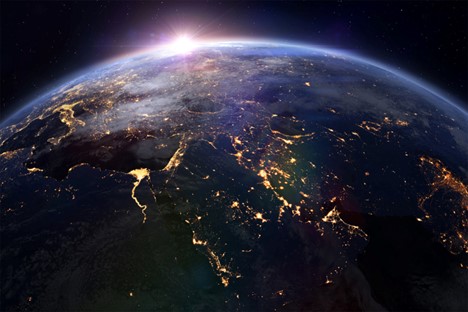
To listen to today’s reflection as a podcast, click here
More than 20 years ago, my three sons and I got to take the trip of a lifetime.
We drove from our home in central Indiana to Alaska and back (9,210 miles in all). Following the Alaska Highway, we traversed the densely forested “wilderness” of the western Canadian provinces and Yukon Territory. It was one of the few times we’ve ever truly been able to say, “Right now we are in the middle of nowhere.”
Fortunately, there are gas stations about every hundred miles in the middle of nowhere.
In the vicinity of a beautiful lake in British Columbia, we pulled up to a tiny mom and pop store. There was a single pump outside where gas was available for about twice what we would have paid back home. The proprietor, a man who appeared to be in his 70’s, walked toward us and said, “Fill ‘er up?”
I couldn’t believe my eyes. He was wearing a bright red T-shirt that said Indiana University Basketball.
“Did you notice our license plate?” I asked. “Yes, sir, I see you’re from Indiana.” Then he smiled proudly and said, “Do you know who gave me this T-shirt? Bobby Knight himself. This is the lake where he comes to fish every summer.” I thought, “Of all the gas stations out in the wilderness, how in the world did we end up at the one patronized by the archenemy of my alma mater?”
I said to this nice man, “You know, not everyone who lives in Indiana roots for IU. I went to another school there – Purdue.” He grinned back at me, “Oh, I know about Purdue.”
I might as well have been filling my tank in Bloomington, Indiana. At the risk of reminding you of a song that you might not be able to get out of your head, it’s a small world after all.
From a geophysical standpoint, the Earth has barely changed during the course of human history. But when it comes to other matters, our planet has never seemed smaller.
Consider communication. It used to take weeks to hand-deliver messages across the Atlantic Ocean. If the weather was unfavorable, it might take months. On January 8, 1815, General Andrew Jackson led American troops to victory over the British at New Orleans in the most famous battle of the War of 1812. What neither side knew – what they could not possibly have known – is that the war had formally ended with the Treaty of Ghent 15 days earlier.
In our own time, emails, video streams, texts, Zooms and TikTok dances can be delivered to virtually any place on Earth in a matter of seconds.
Jules Verne’s 1872 novel Around the World in 80 Days thrilled readers with the prospect of what seemed like hyper-fast travel. Today it’s not unrealistic to say that if you had to plant your feet in almost any other spot within the next 24 hours (apart from politically restricted areas), you could pull it off. It would no doubt be expensive, but it could be done.
Are you intimidated by language barriers? Those are falling, too. Handheld digital translators can eliminate conversational obstacles between English and more than 100 other languages.
Essentially, we live in the first generation in which ordinary people can go almost anywhere at any time.
The bad news is that we have the trail of debris to prove it. Microplastic particles – tiny bits of degraded plastic products – have now been found on Mt. Everest, the highest point on earth, and in the Mariana Trench, seven miles below the surface of the Pacific Ocean.
But the good news is that other things can go anywhere and everywhere, too – such as God’s Good News.
Jesus’ last words were not the ones he spoke in agony on the cross. His actual final words were delivered to his disciples about 40 days later. They are found in five places in the New Testament – the books of Matthew, Mark, Luke, John, and Acts.
With a few variations, they all say the same thing:
Go! Be disciples (lifelong learners of everything I’ve taught) who make more disciples. Enfold them, through baptism, into the global community of fellow apprentices, sustained by the strength and presence of the tri-personal God (Father, Son, and Holy Spirit).
And don’t stop until you’ve presented this opportunity to every people group on the planet.
Historians estimate that when Jesus presented what’s come to be known as the Great Commission to his original band of followers, they would each have had to reach at least 1 million people in order to carry it out.
Twenty centuries have come and gone. Today our best guess is that each committed disciple would need to reach 14 people to fulfill the Great Commission.
It’s a much smaller world after all.
Today we have the means to have real-time conversations, interactions, and prayers with people of all backgrounds, all over the world. Buoyed by God’s grace and power, what looked like an impossible task is now within reach.
Just imagine who we might be able to meet.
And maybe even convince to trade up for a different T-shirt.
